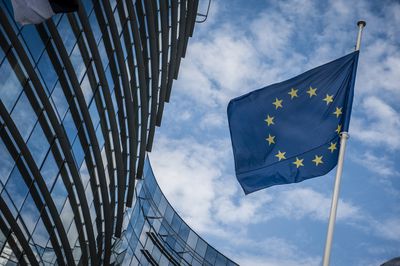The European Union's wide-reaching new regulations to target Apple and other big tech companies will come into effect in early 2023, according to EU antitrust chief Margrethe Vestager (via TechCrunch).

The EU's Digital Markets Act (DMA) could force Apple to make major changes to the App Store, Messages, FaceTime, third-party browsers, and Siri in Europe. For example, it could be forced to allow users to install third-party app stores and sideload apps, give developers the ability to closely interoperate with Apple's own services and promote their offers outside the App Store and use third-party payment systems, and access data gathered by Apple.
One of the more recent additions to the DMA is the requirement to make messaging, voice-calling, and video-calling services interoperable. The interoperability rules theoretically mean that Meta apps like WhatsApp or Messenger could request to interoperate with Apple's iMessage framework, and Apple would be forced to comply.
In a speech at the International Competition Network conference in Berlin, Vestager said that the DMA "will enter into force next spring and we are getting ready for enforcement as soon as the first notifications come in." The DMA was originally supposed to come into effect in October 2022, suggesting that there has been a slight delay in preparing for the new legislation. Vestager also mentioned that the first enforcements could follow soon after the regulation is in place, and discussed the EU's ongoing preparations:
This next chapter is exciting. It means a lot of concrete preparations. It's about setting up new structures within the Commission, pooling resources... based on relevant experience. It's about hiring staff. It's about preparing the IT systems. It's about drafting further legal texts on procedures or notification forms. Our teams are currently busy with all these preparations and we're aiming to come forward with the new structures very soon.
EU lawmakers provisionally approved the DMA in March. The European Parliament and the European Council must give final approval to the legislation before it can come into force. Big tech companies that meet the criteria to be designated a "gatekeeper" must declare their status to the European Commission within three months after the regulation comes into effect, and there is an additional two month period for the EU to confirm a gatekeeper's designation, meaning that it may still be some time before companies face enforcement measures.
Apple is almost certain to be classified as a "gatekeeper," due to the size of its annual turnover in the EU, its ownership and operation of platforms with a large number of active users, and its "entrenched and durable position" due to how long it has met these criteria, and will therefore be subject to the rules set out in the DMA.
Beyond the European Union, Apple's ecosystem is increasingly coming under intense scrutiny by governments around the world, including in the United States, the United Kingdom, Japan, South Korea, and more, with a clear appetite from global regulators to explore requirements around app sideloading and interoperability. Vestager suggested that a significant level of cooperation is already occurring as part of preparations for the DMA, and urged national competition authorities around the world to closely cooperate:
For that next chapter, close cooperation with competition authorities, both inside and outside the EU will be crucial. This is irrespective of whether they apply traditional enforcement tools or have developed their own specific regulatory instruments, like the German digital regulation. Close cooperation will be necessary because we will not be short of work and we will not be short of novel services or practices to look at. And the efforts needed at a global scale are enormous. So we will need to work together more than ever.
Many of you will be watching the roll out of the DMA with great interest. This will be a mutual learning experience. The EU has worked hard to find the right balance, and I think we have come up with something that is tough but also very fair. It goes without saying that the more we, as an international competition community, are able to harmonize our approach, the less opportunity there will be for global tech giants to exploit enforcement gaps between our jurisdictions.
The DMA says that gatekeepers who ignore the rules will face fines of up to 10 percent of the company's total worldwide annual turnover, or 20 percent in the event of repeated infringements, as well as periodic penalties of up to 5 percent of the company's total worldwide annual turnover. Where gatekeepers perpetrate "systematic infringements," the European Commission will be able to impose additional sanctions, such as obliging a gatekeeper to sell a business or parts of it, including units, assets, intellectual property rights, or brands, or banning a gatekeeper from acquiring any company that provides services in the digital sector.
So far, Apple has heavily resisted attempts by governments to enforce changes to its operating systems and services. For example, Apple simply chose to pay a $5.5 million fine every week for ten weeks in the Netherlands instead of obey orders from the Authority for Consumers and Markets (ACM) to allow third-party payment systems in Dutch dating apps. Earlier this week, the ACM announced that Apple's rules surrounding Dutch dating apps remain insufficient.
Note: Due to the political or social nature of the discussion regarding this topic, the discussion thread is located in our Political News forum. All forum members and site visitors are welcome to read and follow the thread, but posting is limited to forum members with at least 100 posts.





















